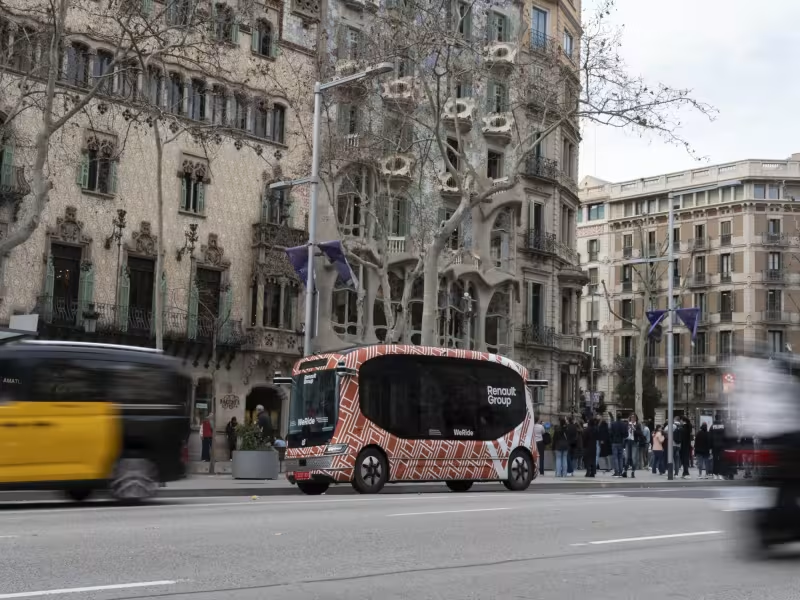
SHERIDAN, WYOMING – April 15, 2025 - Renault Group Accelerates Autonomous Public Transport Vision Across Europe
As the future of urban mobility gains traction, Renault Group is making significant strides with its autonomous electric miniBus initiative, designed to offer more accessible, efficient, and sustainable public transport solutions. In collaboration with global autonomous technology leader WeRide, Renault Group is not only testing but actively shaping the mobility landscape in Europe through real-world experimentation in cities such as Barcelona, Valence, and Zurich.
A Proven Solution with Real-World Results
In May 2024, Renault Group took a pivotal step by launching its autonomous vehicle strategy and conducting its first public open-road test in Europe during the Roland-Garros international tennis tournament. Partnering with WeRide, two autonomous miniBuses covered over 1,000 kilometers and transported nearly 700 passengers.
“This first full-scale test demonstrated the maturity of the technology as well as the relevance of this passenger transport solution,” the company shared.
Following this success, interest from local authorities, transport operators, and private site managers has surged, reflecting a growing recognition of the potential for autonomous vehicles to transform everyday mobility.
Urban Impact: Barcelona at the Forefront
Renault Group brings future mobility to the heart of the city
From March 10–14, 2025, residents and visitors in Barcelona experienced a glimpse of future mobility as two autonomous miniBuses operated along a 2.2-kilometer route in the city’s urban core. This high-profile demonstration highlighted the miniBus solution’s adaptability to complex urban environments.
By showcasing real-time operations in dense city traffic, Renault Group and WeRide proved the viability of autonomous transport in making cities more livable and environmentally friendly. The initiative aligns with the Group’s broader vision of addressing Europe’s public transport challenges through innovation.
Connecting Communities: Valence’s Suburban Leap
Autonomous shuttles bridge gaps between transit and workplaces
In Valence, France, Renault Group and its partners beti, Macif, and WeRide launched an experiment from March 10 to April 19, 2025, with plans to establish a commercial autonomous shuttle service by July 2025. This initiative focuses on connecting the Valence TGV station to a surrounding 162-hectare business park, home to 150 companies and 3,000 employees.
The 3.3-kilometer route addresses a critical need for efficient, last-mile connectivity. “Through this unprecedented collaboration between 4 major players, the same vision is materialised: that of shared automated mobility at the service of all territories,” Renault Group emphasized.
Secure Operations: Zurich Airport Pioneers Private-Site Mobility
Autonomous miniBuses streamline travel for airport employees
Since January 2025, Zurich Airport has hosted a test of WeRide’s autonomous shuttles, aimed at facilitating staff movement between terminals. This trial illustrates the technology’s reliability and safety in a high-security, complex environment—proving its potential for wider application in similarly demanding contexts.
A Differentiated and Strategic Approach to Autonomy
Renault Group’s approach distinguishes between individual vehicle autonomy and public transportation solutions. While the Group continues to refine Advanced Driver Assistance Systems (ADAS) like Adaptive Cruise Control and Lane Keeping for personal vehicles, it sees greater near-term value in Level 4 (L4) autonomy for public transit.
“Renault Group sees a relevance in offering L4 autonomous vehicles in the short term, i.e. capable of managing driving situations on their own, in Operational Design Domain, with remote supervision, but without an operator on board,” the company stated.
Autonomous miniBuses are already showing promise in delivering a carbon-free, flexible, and secure transport option that can adapt to the needs of both urban and peri-urban areas. Looking ahead, Renault Group is exploring the development of a robotised electric miniBus platform by 2030, integrating partner-led automation solutions.
A Powerful Partnership for a Sustainable Future
With over 1,200 autonomous vehicles in operation—including 300 miniBuses—WeRide has accumulated more than 40 million kilometers across Asia, the Middle East, and North America. This collaboration reinforces Renault Group’s vision for sustainable, shared mobility in Europe.
By working together, Renault Group and WeRide are establishing a solid foundation for scaling autonomous public transportation across diverse European contexts, from bustling metropolises to business hubs and high-security private campuses.
Discover More About Renault Group’s Vision
To learn more about Renault Group and its initiatives for reinventing mobility, visit www.renaultgroup.com.